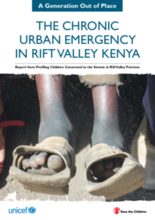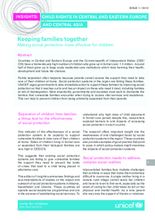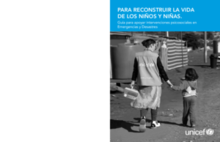Displaying 131 - 140 of 198
The purpose of this review was to identify evidence-based early response strategies and interventions for improving the outcomes of children outside of family care, including children of and on the street, institutionalized children, trafficked children, and children affected by conflict and disaster, and who are exploited for their labor. A conclusion was drawn that there is a strong need for strengthening the evidence base regarding the effectiveness or early assessments and responses to children living outside family care and for using evidence to guide operational policy and practice.
Research was conducted in five Rift Valley towns in Kenya in 2011 to understand the link between emergencies and the perceived increase of children joining the streets. Findings show that emergencies such as Post Election Violence and drought have caused children to join the streets. By far the biggest reason for children joining the streets was food insecurity. The authors advocate for an urgent, large-scale response to place children currently connected to the streets in durable situations in tandem with a multi-sectorial development approach to tackle and address the root of the crisis.
Promotes and provides inter-agency information management tools for a coordinated approach to child protection particularly in regards to separated children, children associated with armed groups and forces and other especially vulnerable children.
The Ministry of Gender Equality and Child Welfare (MGECW) of Namibia released the 2012 Foster Care Standards and Guidelines which are aimed to guide social workers and other service providers in recruiting, assessing, training, matching, supporting, supervising and monitoring foster care services. The Foster Care Guidelines assist in translating the Standards into day-to-day practices. These Standards and Guidelines with accompanying training manuals were prepared to strengthen supported family-based care for vulnerable and marginalized children.
Hope and Homes for Children has been implementing ACTIVE Family Support in Sarajevo Canton in BiH since 2003. The program consists of two elements: the prevention of separation of children from their parents as the primary focus, and the reintegration of separated children from institutions back into their biological families. This unique and holistic program is tailored to the individual needs of each child and family and it is built on the following core values: partnership, respect, inclusion, sustainability and the best interest of the child.
This edition of Insights produced by UNICEF summarizes the findings and recommendations of studies on the impact and outreach of social protection systems in Albania, Kazakhstan, and Ukraine where high rates of child placement in formal care still persist. The research offers important insight into the weaknesses and challenges faced by social protection systems in the region, but also point to ways in which policy-makers might maximise the impact of social protection systems in order to ‘keep families together’.
Este informe presenta detalles de talleres para favorecer el desarrollo y adquisición de conocimientos, habilidades y destrezas para lograr una adecuada intervención psicosocial en las poblaciones afectadas por el terremoto/maremoto.
This Advocacy Package explains what the IASC guidelines are and how they are to be used, highlights the key campaigning activities, key messages for communities, donors, UN Agencies and Non-Governmental organisations, clarifies terminology and provide ideas for country level implementation.
Briefing note on supporting refugee families through asset-based family strengthening programs.
Report looking at the milestones met and challenges ahead in responding to the needs of children and communities in earthquake affected Haiti. Includes reporting on child protection specific needs and the situation of children without parental care.









